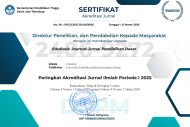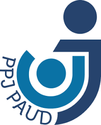Development of Digital Interactive Module “E-MOSI” (Elektronik Modul Puisi) for Grade IV Students of Elementary School of Kemala Bhayangkari 02
Abstract
Keywords
Full Text:
PDFReferences
Anandari, Q. S., Kurniawati, E. F., Piyana, S. O., Melinda, L. G., Meidiawati, R., & Fajar, M. R. (2019). Development of electronic module: Student learning motivation using the application of ethnoconstructivism-based flipbook kvisoft. Jurnal Pedagogik, 6(2), 416–436.
Andyani, H., Setyosari, P., Wiyono, B. B., & Djatmika, E. T. (2020). Does technological pedagogical content knowledge impact on the use of ICT in pedagogy? International Journal of Emerging Technologies in Learning (IJET), 15(3), 126–139.
Anwar, S., Pramujiono, A., Astuti, S. B., & Ardianti, M. (2020). Pembelajaran bahasa indonesia untuk generasi milenial. Jurnal Ilmiah FONEMA : Jurnal Edukasi Bahasa dan Sastra Indonesia, 3(1), 58–67.
Astuti, W. P., Marwiyah, M., Ihsani, A. N. N., & Rachmawati, A. (2019). Pengembangan bahan ajar mata kuliah pangkas rambut lanjutan. Jurnal Ilmiah Pendidikan Teknik dan Kejuruan, 12(1), 1–10.
Asmah, S., Yeni, L. F., & Titin, T. (2020). Development of interactive multimedia based on lectora inspire in kingdom monera material. JPBIO (Jurnal Pendidikan Biologi), 5(2), 114–126.
Bekti, N., Dwi, W., Gola, N., Raudhotus, R., Nuraini, L., & Anggraeni, F. K. A. (2021). Pengembangan modul interaktif berbasis Macromedia Flash 8 pada materi optik geometri. ORBITA: Jurnal Kajian, Inovasi dan Aplikasi Pendidikan Fisika, 7(1), 123–135.
Dewi, R. K., Wardani, S., Wijayati, N., & Sumarni, W. (2019). Demand of ICT-based chemistry learning media in the disruptive era. International Journal of Evaluation and Research in Education, 8(2), 265–270.
Fadliansyah, F. (2019). Efektivitas media neo snake and ladder game terhadap kemampuan komunikasi matematis siswa. EduBasic Journal: Jurnal Pendidikan Dasar, 1(1), 11–20.
Ishaq, K., Azan, N., Zin, M., Rosdi, F., Abid, A., & Ijaz, M. (2020). The impact of ICT on students’ academic performance in public private sector Universities of Pakistan. International Journal of Innovative Technology and Exploring Engineering, 9(3), 1117–1121.
Lestari, I. P., Dewi, R. F. K., & Ulia, N. (2020). Pengembangan You-Mathbook untuk meningkatkan, pemahaman konsep perkalian pada, siswa SD Islam Darul Huda Kota Semarang. Profesi Pendidikan Dasar, 7(1), 105–120.
Meifisya, T., Egok, A., & Yuneti, A. (2020). Penerapan model children’s learning in science berbasis kearifan lokal pada pembelajaran IPA siswa kelas IV SD Negeri 3 Srikaton. Journal of Elementary School (JOES), 3(2), 129–135.
Muzijah, R., Wati, M., & Mahtari, S. (2020). Pengembangan e-modul menggunakan aplikasi Exe-Learning untuk melatih literasi sains. Jurnal Ilmiah Pendidikan Fisika, 4(2), 89–98.
Rahmatsyah, S. W., & Dwiningsih, K. (2021). Development of interactive e-module on the periodic system materials as an online learning media. Jurnal Penelitian Pendidikan IPA, 7(2), 255–261.
Rizqi, M. (2019). Desain perangkat pembelajaran dengan pendekatan pendidikan matematika realistik berbasis kemampuan pemahaman matematis. Prosiding Seminar Pendidikan Matematika dan Matematika, 1, 1–11.
Safitri, E., & Nurkamilah, S. (2020). Pengembangan bahan ajar digital berbasis android untuk peserta didik berkebutuhan khusus. JOEAI: Journal of Education and Instruction, 3(2), 296–304.
Sariyatun, S., Suryani, N., Sutimin, L. A., Abidin, N. F., & Akmal, A. (2021). The effect of digital learning material on students’ social skills in social studies learning. International Journal of Instruction, 14(3), 417–432.
Sujinah, S. (2020). Tantangan dan solusi pembelajaran bahasa indonesia di era Covid-19. Stilistika: Jurnal Pendidikan Bahasa dan Sastra, 13(2), 256–271.
Talebian, S., Mohammadi, H. M., & Rezvanfar, A. (2014). Information and Communication Technology (ICT) in higher education: Advantages, disadvantages, conveniences and limitations of applying e-learning to agricultural students in Iran. Procedia - Social and Behavioral Sciences, 152, 300–305.
van Acker, F., van Buuren, H., Kreijns, K., & Vermeulen, M. (2013). Why teachers use digital learning materials: The role of self-efficacy, subjective norm and attitude. Education and Information Technologies, 18(3), 495–514.
Wahyudi, N, G. (2019). Desain pesan pembelajaran di era digital. Evaluasi Jurnal Manajemen Pendidikan Islam, 3(1), 104–135.
Wijaya, E. Y., Sudjimat, D. A., & Nyoto, A. (2016). Transformasi Pendidikan abad 21 sebagai tuntutan pengembangan sumber daya manusia di era global. Prosiding Seminar Nasional Pendidikan Matematika, 1, 263–278.
DOI: https://doi.org/10.17509/ebj.v3i2.32617
Refbacks
- There are currently no refbacks.
Copyright (c) 2021 Universitas Pendidikan Indonesia
This work is licensed under a Creative Commons Attribution 4.0 International License.
This journal is indexed by




.png)




.png)
1.png)


1.png)

.png)